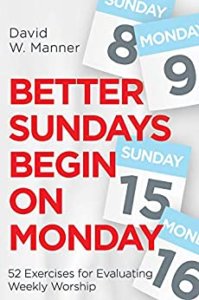David Manner says the goal of healthy intergenerational worship is unobtainable unless the different generations within your church are first interacting together outside of worship. He outlines six suggestions for bringing those of different ages together in prayer, Bible study, service, song, fellowship, and communion.
How can congregations expect to have healthy intergenerational worship when they segregate by age in all of their other ministries during the week? The only time various generations connect is during an hour on Sunday around songs one generation or the other doesn’t particularly like. If congregations are depending on the music of that one hour to be the solitary driver of intergenerational worship, then music can’t help but get the solitary blame when conflict arises.
What if, instead, all generations attempted to connect by first learning to love, respect, and defer to one another outside of the worship service? Couldn’t those relationships that develop outside of the services then positively affect the relationships inside the worship services as well?
Intergenerational worship is only possible if our common ground is deference instead of preference. Deference is a learned and practiced submission based on conviction; preference is based on feeling and traditionalism. Deference encourages worshippers to respond in spite of the traditionalism and embedded theology that previously influenced their thinking actions. The willingness to defer to others offers a common ground that style and musical preferences never will.
Deference is the agreement that, although we may not always love the music of our children or grandchildren, we are willing to sacrifice because we love our children and grandchildren. Deferring is setting aside our preferences for the good of and future of those children and grandchildren. It is possible for grandparents and grandchildren to worship together as long as the battle lines are drawn over who can offer or give the most instead of who deserves or demands the most. Healthy intergenerational worship may not occur until worship leaders are willing to lead dispersed intergenerational worship before attempting to lead gathered intergenerational worship.
Here are six suggestions:
1. Lead different generations to pray for and with one another. Praying for and with one another is not just praying for another generation to change its minds. Praying for and with one another requires communication, vulnerability, honesty, trust, brokenness, and selflessness.
2. Lead them to read Scripture to and with one another. Scripture must be the foundation of intergenerational worship. Nothing softens the heart of a grandparent more than to hear his or her grandchild read the word of God.
3. Lead them to share ministry together. Shared ministry requires sacrifice, humility, and an investment of time and trust. Serving others together encourages and generates unity that our music sometimes can’t.
4. Lead them to play together. Those relationships exemplified by the Acts 2 church of spending time together, having everything in common, breaking bread in their homes, and eating together with glad and sincere hearts are often foreign relationships beyond our own generation.
5. Lead them to the Table together. We keep trying to manufacture unity that is already available at the Communion Table. Unity is waiting for all generations there.
6. Lead them to sing together. If unity is the basis of intergenerational worship during the week, then unity will yield intergenerational worship on Sunday. When that occurs, how can we keep from singing our various songs together?
 This article is excerpted from Better Sundays Begin on Monday: 52 Exercises for Evaluating Weekly Worship (Abingdon Press, 2020) by David W. Manner. ©2020 Abingdon Press. Used by Permissions. All rights reserved. The book is available at Cokesbury and Amazon.
This article is excerpted from Better Sundays Begin on Monday: 52 Exercises for Evaluating Weekly Worship (Abingdon Press, 2020) by David W. Manner. ©2020 Abingdon Press. Used by Permissions. All rights reserved. The book is available at Cokesbury and Amazon.
Related Resources
- Intergenerational Ministry for the Post-pandemic Church by Doug Powe
- Why Intergenerational Ministry? by Liz Perraud






